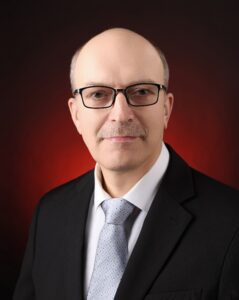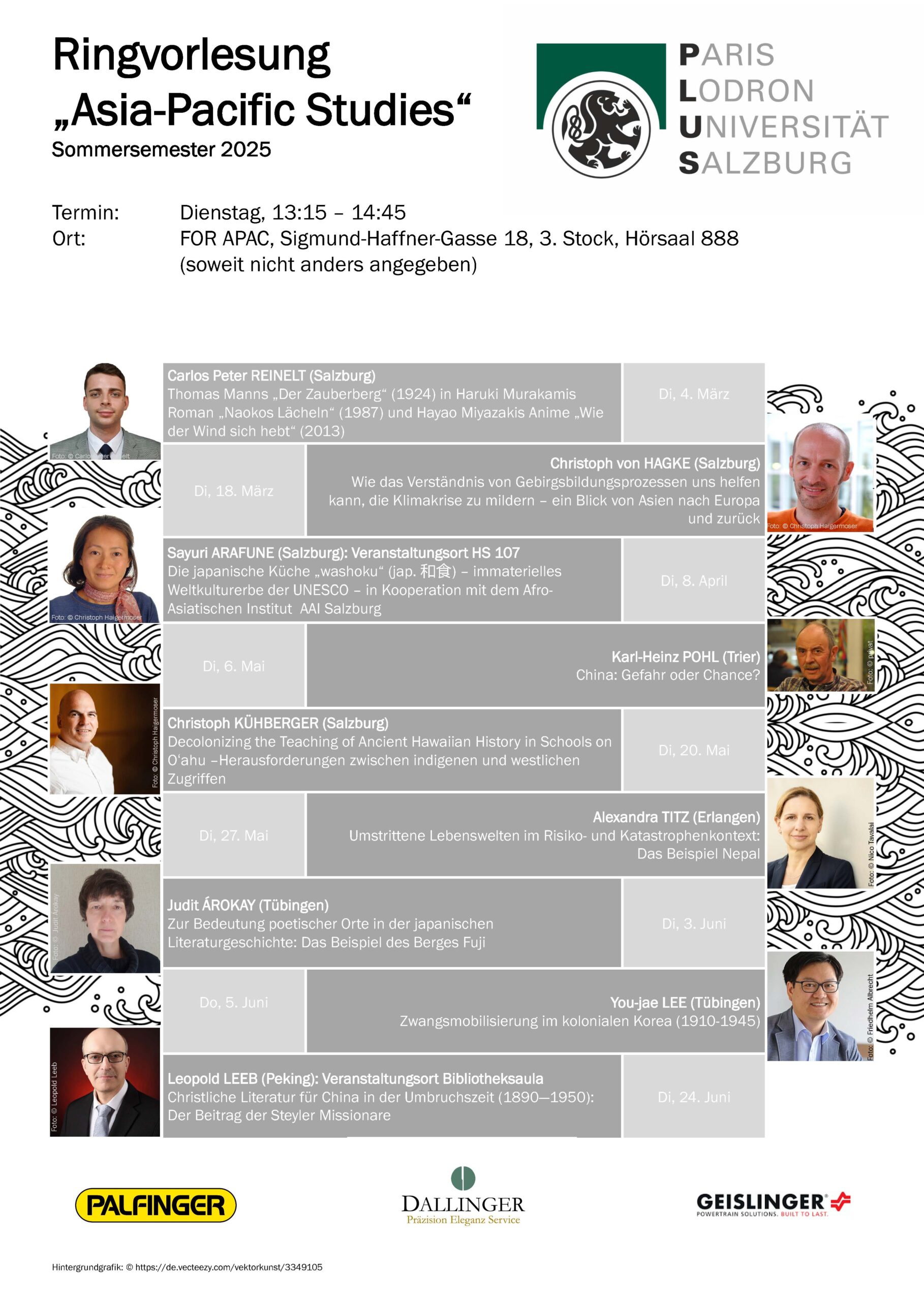Tuesday, 4 March 2025, 1:15-2:45 PM
Sigmund-Haffner-Gasse 18, HS 888
Thomas Mann’s “The Mystical Mountain” (1924) in Haruki Murakami’s Novel “Naoko’s Smile” (1987) and Hayao Miyazaki’s Anime “How the Wind rises” (2013)”
Carlos Peter Reinelt, MEd BEd
University of Salzburg
Thomas Mann’s literature exerted a considerable influence on important post-war writers such as Yukio MISHIMA (1925-1970), Morio KITA (1927-2011) and Kenzaburō ŌE (1935-2023).With Hayao Miyazaki (1940*) and Haruki Murakami (1949*), however, the lecture is dedicated to two younger artists who, in the same tradition, attempt to come to terms with contemporary Japanese history through intertextual references to Thomas Mann’s Magic Mountain.Both Murakami’s novel and Miyazaki’s film situate a sanatorium inspired by Mann in the Japanese Alps:Both are a place of refuge for an old castorp hiding from the Nazis after they seized power in 1933, and a refuge for mentally troubled students who are searching in vain for peace of mind far away from the 1968 riots in Tokyo. The extent to which differences and similarities are depicted in the artistic confrontation with the past of the former Axis powers will be discussed.
Lecturer: Carlos Peter Reinelt is a lecturer at the Department of German Studies at the University of Salzburg.
After two study visits to Tokyo, he taught for two years at Fudan University in Shanghai, where he was also director of the Austrian Center.
(Photo: © tba)
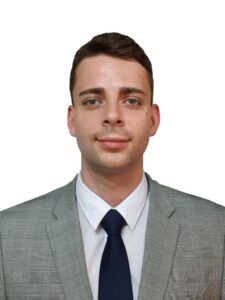
Tuesday, 18 March 2025, 1:15-2:45 PM
Sigmund-Haffner-Gasse 18, HS 888
“How understanding mountain building processes can help us mitigate the climate crisis – a look from Asia to Europe and back”
Prof. Dr. Christoph von Hagke
University of Salzburg
As the consequences of the climate crisis become ever clearer, geoengineering is increasingly becoming the focus of scientific, political and public attention. Geoengineering aims to stabilize global temperatures and mitigate extreme weather events through targeted technical interventions such as CO₂ removal from the atmosphere. However, a deep understanding of geological processes is required to apply these techniques. In this talk, I will first explain basic aspects of the Earth system that are necessary to understand geoengineering. Then I will discuss techniques in more detail and show how the Himalayas and the Alps have influenced the global climate in the past. This knowledge, coupled with a quantitative understanding of underground structures, is essential for a responsible and internationally coordinated use of geoengineering.
(Photo: © Simon Haigermoser)
Short Biography
2012 PhD at the FU Berlin / GFZ Potsdam on the interaction between climate and mountain building processes
2012-2014: TO Fellowship of the California Institute of Technology (Caltech), USA
2014-2020: RWTH Aachen University – Habilitation on the dynamics of the Wilson cycle
07/2019: Visiting professorship at the Université des Antilles, Guadeloupe
2020: Outstanding Early Career Scientist Award of the European Geoscience UnionSince
2020: Professor of Geology at the University of Salzburg
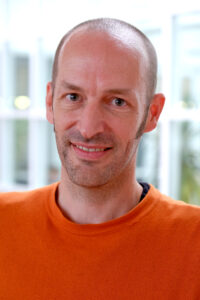
Tuesday, 8 April 2025,1:15-2:45 PM
Universitätsplatz 1, HS 107
„The Japanese Kitchen „washoku“ (jap. 和食) – Intangible world cultural heritage of UNESCO“
In cooperation with the Afro-Asian Institute, AAI, Salzburg
Sayuri Arafune M. Sc, M. A.
University of Salzburg
In December 2013, UNESCO declared Japanese cuisine an intangible world cultural heritage on the grounds that it is characterized by its harmony with nature and its balance. It is repeatedly reported in the media as well as by doctors and nutrition experts that Japanese cuisine is one of the healthiest in the world and prolongs life, which can be proven by facts and figures such as the very long (healthy) life expectancy of Japanese society. What kind of meal is considered “washoku” or healthy in Japan? What does nutrition education look like where “health” is a compulsory subject in schools and the daily school lunch is planned not only with calorie calculations, but also with the salt and protein content in grams? The lecture will shed light on the fact that the term “washoku” does not (only) refer to individual dishes or ingredients, but rather to an overall concept.
Sayuri Arafune, born and raised in Matsuyama/Japan, is a lecturer and language teacher at the Language Center of the University of Salzburg and the Afro-Asian Institute in Salzburg. After completing two master’s degrees in physics and German studies at the University of Ehime/Japan and managing the Upper Rhine Region/Freiburg Business Contact Office in Matsuyama, she studied linguistics at the University of Salzburg. She has been living and working as a Japanese teacher in Salzburg for 20 years and teaches the language and culture of Japan, whereby “the food culture of Japan” is repeatedly discussed at the request of the participants.
(Photo: © Simon Haigermoser)
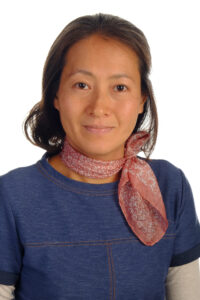
Tuesday, 6 May 2025,1:15-2:45 PM
Sigmund-Haffner-Gasse 18, HS 888
“China: Peril or Chance?”
Prof. Dr. Karl-Heinz Pohl
University of Trier
The image of China in Germany could hardly be worse at the moment – it is seen as the new “evil empire” – a “yellow peril” 2.0. However, this view bears no relation to the actual knowledge about China in this country, which hardly extends beyond a few stereotypical prejudices. A blind spot in the perception is the role of the USA. The rivalry between the two superpowers, the USA and China, is examined in its geopolitical context. This concerns controversial issues and conflict hotspots such as Xinjiang, Taiwan, Hong Kong and the South China Sea, all of which are presented in their historical contexts. In view of the current confrontation, the outlook suggests that the opportunities for a peaceful future would lie in the realization that peace, security and prosperity can only be achieved together, through a policy of reciprocity, dialogue at “eye level” and respectful recognition of the other. What is needed is a policy that moves away from concepts of “unilateral security” towards guiding principles of “cooperative security” and cooperation instead of confrontation.
Karl-Heinz Pohl (卜松山), born in 1945 in Saarlouis. Studied Sinology, Japanese Studies and Art History at the Universities of Hamburg, Bonn and Toronto (Canada). 1982 Ph.D. in East Asian Studies at the University of Toronto. 1987 – 1992 Professor of Chinese Literature and Intellectual History at the University of Tübingen. 1992 – 2010 Professor of Sinology at the University of Trier. Retired since 2010.
Areas of work: Chinese intellectual history, ethics and aesthetics of modern and pre-modern China, intercultural communication and dialog between China and the West.
Publications (selection): China for Beginners. Eine faszinierende Welt entdecken, Bochum: Europäischer Universitätsverlag, 2020 (updated new edition). Ästhetik und Literaturtheorie in China – Von der Tradition bis zur Moderne, Munich: Saur Verlag, 2006. ed. (with Gudrun Wacker and Liu Huiru): Chinesische Intellektuelle im 20. Jh.: Zwischen Tradition und Moderne, Hamburg: Institut für Asienkunde, 1993. ed. Chinese Thought in a Global Context: A Dialogue Between Chinese and Western Philosophical Approaches, Leiden: Brill, 1999. ed. (with Anselm W. Müller): Chinese Ethics in a Global Context. Moral Bases of Contemporary Societies. Leiden: Brill, 2002. ed. (with Gudrun Wacker): Li Zehou: The Way of the Beautiful, Freiburg: Herder, 1992 (new edition: Bochum: Europäischer Universitätsverlag, 2022). Ed. (with Lujun Chen), East-West Dialogue, Singapore: Palgrave Macmillan, 2023 (open access).
(Photo: © Karl-Heinz Pohl)
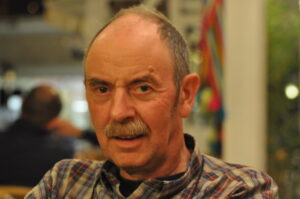
Tuesday, 20 May 2025, 1:15-2:45 PM
Sigmund-Haffner-Gasse 18, HS 888
„Decolonizing the Teaching of Ancient Hawaiian History in Schools on Oʻahu – Challenges between indigenous and western approaches“
Prof. Dr. Christoph Kühberger
University of Salzburg
The lecture provides insights into how the past is dealt with in Hawai’i. The starting point for this is settler colonialism, which has its distinctive starting points with the encounter between Cook’s ship’s crew and the Hawaiians in 1778 and the arrival of missionaries in 1820 and which continues to this day. Against this background, the currently valid concepts of the Department of Education of the State of Hawai’i for teaching history (Social Studies/History) will be examined, as well as the challenges faced by teachers in a (post-)colonial situation, with a particular focus on the indigenous approach
to the past and the possibility of greater visualization in the current school system.
Christoph Kühberger, Prof., Mag. et Dr. phil. habil., studied history and Italian studies (teacher training). Teacher of history at the Universities of Salzburg, Greifswald and Hildesheim as well as the Salzburg Stefan Zweig University of Education. Since 2017 University Professor of History and Political Didactics at the Department of History/University of Salzburg, 2021-2024 Head of the Department of History. Current research focus: Historical thinking, digital humanities, decolonization, historical culture.
(Photo: © Michael Brauer Photographie)
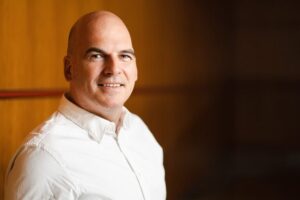
Tuesday, 27 May 2025, 1:15-2:45 PM
Sigmund-Haffner-Gasse 18, HS 888
“Controversial living environments in a risk and disaster context:The example of Nepal”
PD Dr. Akad. ORätin Alexandra Titz
Friedrich-Alexander-University of Erlangen-Nürnberg
For many, Nepal is synonymous with imposing mountain worlds and cultural diversity. Despite this “wealth” and progress in the fight against poverty, the South Asian country is still one of the poorest countries in the world. The survival of the population is closely linked to the use of natural resources and is threatened by environmental changes and extreme natural events. The culturally diverse society is highly fragmented, which manifests itself in massive socio-economic inequalities and the systematic exclusion of certain groups from political, economic and social processes. As a result, parts of the population are unable to mobilize potential survival and risk reduction strategies or even lack the ability to avert disasters altogether.
On April 25, 2015, the Himalayan state of Nepal was shaken by a devastating 7.8-magnitude earthquake, which was followed by a severe 7.3-magnitude quake on May 12. According to official figures, more than 8,800 people were killed and 22,300 injured; 882,000 houses were destroyed, and 2.8 million people were left homeless and displaced. Around 17,000 internally displaced persons (IDPs) fled from the worst-affected rural regions to the densely populated Kathmandu Valley – and some of them are still living there in precarious conditions today. While the drivers of displacement in the event of disaster are relatively well understood, uncertainties remain regarding the long-term displacement and immobility of IDPs, the (apparent) inability of some to leave places of displacement, and the reasons for others to stay.
Taking a cultural geography perspective on the interplay of social inequality and lack of coping capacities, this presentation aims to highlight the complexity of protracted and multiple disaster displacement and to provide a better understanding of the obstacles to achieving durable solutions.
(Photo: © Nico Tavalai)
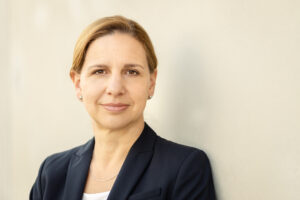
Tuesday, 3 June 2025, 1:15-2:45 PM
Sigmund-Haffner-Gasse 18, HS 888
„The significance of poetic places in Japanese literary history: The example of Mount Fuji“
Prof. Dr. Judit Árokay
University of Tübingen
At every turn in Japanese literature, we encounter names of places that can be geographically localized and at the same time are charged with poetic associations.The tradition of poetic places can be traced back to the 8th century: It has its origins in poetry, but in the centuries that followed it permeated narrative literature, the theater and also influenced the visual arts. This lecture will use the example of Mount Fuji, which became a national symbol in the 20th century, the emergence and development of a poetic motif from the 8th to the 19th century.
Professor Árokay studied German, English and Japanese at the Eötvös Loránd University in Budapest and at the University of Hamburg. D. in 1998 in Hamburg with a thesis on “Classical Japanese women’s poetry as reflected in medieval Japanese poetics”, then research assistant at the Seminar for Japanese Language and Culture at the University of Hamburg until 2004. 2004 to 2007 research assistant at the Free University of Berlin, Japanese Studies. Habilitation in 2007 at the Free University of Berlin with a thesis on “The Renewal of Poetic Language: Poetological and Linguistic Theoretical Discourses of the Late Edo Period”. Since 2007 Professor at the Institute for Japanese Studies at the Ruprecht-Karls-University Heidelberg.
(Photo: © Judit Árokay)
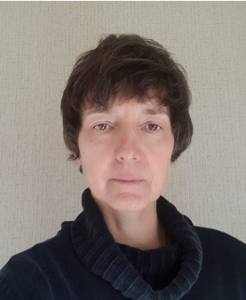
Thursday, 5 June 2025,1:15-2:45 PM
Sigmund-Haffner-Gasse 18, HS 888
“Forced mobilization in colonial Korea (1910-1945)”
Prof. Dr. You-jae LEE
University of Tübingen
The reappraisal of the forced labor of Koreans for Japanese companies during the colonial era has put additional strain on Korean-Japanese relations in recent years. To date, no consensual agreement has been reached on the issue of the comfort women. But what do we mean by forced labor in this context and to what extent did it take place? What were the working and living conditions of the workers? Why did it take so long for it to be addressed and where are the lines of conflict in the reappraisal? These are the guiding questions of the lecture.
Professor Lee studied history, Korean studies, philosophy and political science in Berlin (FU Berlin, HU Berlin) and Seoul (SNU). He completed his doctorate in history at the University of Erfurt, focusing on the topic of Christian missions during the colonial era. In 2010 he was appointed Junior Professor and in 2018 Chair (W3) of Korean Studies at the Eberhard Karls University of Tübingen. His research focuses on postcolonialism, the Cold War, diaspora and the history of everyday life. He has headed the 10-year-old AKS Strategic Research Institute since September 2021 and has been Director of the King Sejong Institute Tübingen since October 2012. His most recent monograph is on Democratization and Protestantism in Korea in the 1970s (co-authorship in Korean) published in Seoul in 2024 and two edited volumes on German-Korean church relations after 1945 and Everyday History in Korean Studies are in print.
(Photo: © Friedhelm Albrecht)
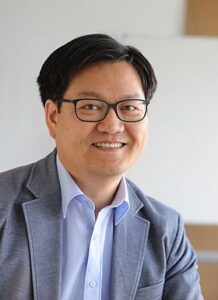
Tuesday, 24 June 2025,1:15-2:45 PM
Hofstallgasse 4, Bibliotheksaula
“Christian literature for China in the period of upheaval (1890-1950):
The contribution of the Steyler missionaries”
Prof. Dr. Leopold Leeb
Renmin University, Beijing, PR China
Christian books have been written and printed by missionaries in China since the 17th century. The Steyler Missionaries (SVD), who worked in Shandong Province from 1882 to 1950, were also known for their publications. They ran several printing houses, which published more than three hundred Chinese and some German works, including mainly spiritual and catechetical texts, as well as illustrated Bible stories, which were used throughout China. Linguistic and anthropological works were also printed, e.g. on customs in Shandong. The history of the Steyler in Shandong, the most important authors, the works and their significance for the church in China are presented with pictures and text examples.
Born 1967 in Hollabrunn, 1985 entry into the St. Gabriel Mission House near Vienna, 1988-1991 study of the Chinese language in Taiwan, 1994 degree in theology at St. Gabriel, 1995-1999 doctoral studies at Peking University, then writer and translator of theological literature, since 2004 teacher of classical languages (Latin, Greek, ancient Hebrew) at the Renmin University of China; publications in Chinese, English and German on classical languages and church history in China and East Asia.
(Photo: © Leopold Leeb)
